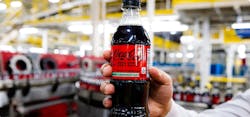Coca-Cola Invests in Airhive DAC Project to Replace Fossil Fuel-Derived Carbon Dioxide in Carbonated Drinks
Airhive, a carbon capture company focused on industrial-based solutions, announced the close of its first investment round to help support the development of a direct air capture (DAC) pilot project.
The investment round was co-led by AP Ventures and Coca-Cola Europacific Partners, the largest bottler of Coca-Cola in the world, with participation from US-based Collaborative Fund and angel investors.
The funding will directly support the continued development of Airhive’s fluidized bed technology to capture carbon from the air and deliver its second DAC commercial pilot project, which will be deployed in 2024.
According to Airhive, its fluidized bed technology utilizes air to make static solid particles behave like a dynamic fluid. Airhive can increase the CO2 uptake capacity of naturally carbon-absorbing rock minerals by reforming them into small particles with very high surface areas.
When these small particles are fluidized, they create a turbulent “sandstorm-like” cloud that rapidly collides with the CO2 molecules in the air. From here, the captured carbon can either be permanently stored or used to decarbonize industrial processes.
This technology is powered exclusively by renewable energy and rapidly captures over 99% of the carbon dioxide from the air that passes through the central vessel in less than 0.1 seconds.
The Airhive DAC pilot system will be located on one of Coca-Cola Europacific Partners’ sites. The DAC system will have the capacity to capture up to 1,000 tons of CO2 annually, and Coca-Cola Europacific Partners will utilize the captured CO2 to replace fossil fuel-derived carbon dioxide in its carbonated drinks.
This partnership directly aligns with the beverage company’s goal of reducing absolute emissions across its value chain by 30% by 2030 and achieving net-zero emissions by 2040.
“Carbonation transforms ordinary liquids into the exciting drinks we sell across the world. The science behind those bubbles is not only important for creating our drinks, but could also offer an interesting new avenue to boost decarbonization. We’re always on the lookout for new and exciting technologies which could fast-track our progress – I’m excited to see where this project takes us,” said Matthijs Kostelijk, Director at Coca-Cola Europacific Partners.
About the Author
Breanna Sandridge, Senior Editor
Breanna Sandridge is senior editor for EnergyTech and Microgrid Knowledge, both part of the energy group at Endeavor Business Media.
Prior to that, Breanna was managing editor for Machinery Lubrication and Reliable Plant magazines, both part of Noria Corp. She has two years experience covering the industrial sector.
She also is a 2021 graduate of Northeastern State University (Oklahoma) with a Bachelor's in English.
